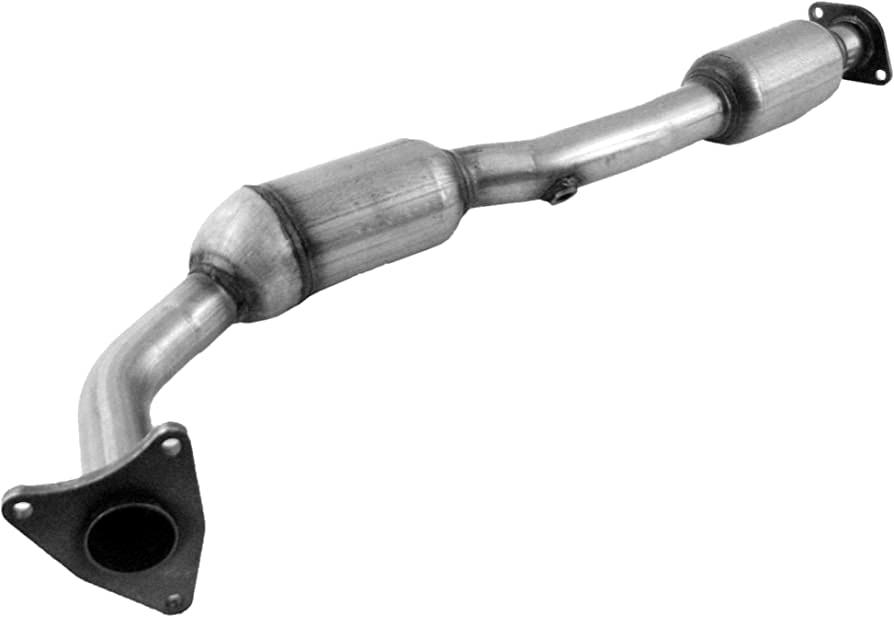Catalytic converters have become an integral part of modern automobiles, and for a good reason. They help to reduce harmful emissions that would otherwise be released into the atmosphere. However, there is a common misconception that catalytic converters also reduce noise. In this blog post, we will delve into what a catalytic converter is, how it works, and whether it reduces noise.
A catalytic converter is a device that is fitted into the exhaust system of a vehicle. It is designed to reduce harmful emissions that are released into the atmosphere. The converter works by converting harmful gases, such as carbon monoxide and nitrogen oxides, into less harmful gases, such as carbon dioxide and nitrogen. The converter contains a catalyst that facilitates the chemical reaction that takes place, hence the name catalytic converter.
Contrary to popular belief, a catalytic converter does not reduce noise. The purpose of the catalytic converter is to reduce harmful emissions, not noise. The reduction in noise is usually taken care of by the muffler or resonator in the exhaust system. The muffler and resonator work by reflecting sound waves back and foth within the exhaust system, which helps to cancel out the noise.
A catalytic converter is an essential component of modern automobiles. It works by converting harmful emissions into less harmful gases. However, the converter does not reduce noise. The reduction in noise is usually taken care of by the muffler or resonator in the exhaust system. It is important to note that removing the catalytic converter is illegal in most states and can have a negative impact on the environment.
Effect of Removing Catalytic Converter on Exhaust Volume
Yes, removing the catalytic converter from your vehicle’s exhaust system will make it louder. The catalytic converter’s purpose is to reduce the harmful emissions produced by your car’s engine. It does this by uing chemical reactions to transform the toxic gases in the exhaust into less harmful substances.
However, this process also reduces the volume of the exhaust noise. Therefore, if you remove the catalytic converter, the exhaust gases will flow more freely, resulting in a louder and more distinctive sound. This can be appealing to some car enthusiasts who want to make their vehicle sound more aggressive or sporty.
However, it’s important to note that removing a catalytic converter is illegal in many countries and can result in hefty fines. Additionally, without a catalytic converter, your vehicle will produce more harmful emissions, which is not only bad for the environment but can also damage your engine in the long run. Therefore, it’s best to leave your catalytic converter intact and explore other ways to enhance the sound of your car if that’s what you desire.

Source: amazon.com
The Impact of Catalytic Converters on Sound
Certainly! A catalytic converter is a component of a vehicle’s exhaust system that is designed to reduce harmful emissions by converting toxic gases into less harmful ones. While the primary function of a catalytic converter is to reduce harmful emissions, it can also affect the sound of the exhaust system.
When exhaust gases pass through a catalytic converter, they are forced through a series of honeycomb-like structures coated with precious metals such as platinum, palladium, and rhodium. These metals act as catalysts, facilitating a chemical reaction that converts harmful pollutants into less harmful ones.
However, this process can also have an effect on the sound of the exhaust system. The honeycomb-like structures in the catalytic converter can cause some restriction and turbulence in the exhaust flow, which can result in a quieter exhaust note. Additionally, the chemical reaction that takes place in the catalytic converter can also cause a slight change in the exhaust pitch, resulting in a deeper or lower tone.
Overall, whie a catalytic converter does not have a significant impact on the sound of the exhaust system, it can cause some minor changes to the exhaust note and pitch.
The Impact of a Catalytic Converter on Exhaust Sound
Yes, a catalytic converter can affect the exhaust sound of a vehicle. The catalytic converter is designed to reduce emissions by converting harmful pollutants into less harmful gases. This process involves slowing down the exhaust flow, whih can result in a muffled sound.
Additionally, the materials used in the construction of the catalytic converter can also affect the exhaust sound. Some high-performance catalytic converters are designed to allow for a freer flow of exhaust gases, which can result in a louder exhaust note.
Removing the catalytic converter altogether can also result in a louder exhaust sound, as there is no longer any restriction on the exhaust flow. However, it is important to note that this is illegal in most areas, as it can greatly increase emissions and harm the environment.
In summary, while the catalytic converter is primarily designed to reduce emissions, it can also have an impact on the exhaust sound of a vehicle.
The Effect of Installing a New Catalytic Converter on Vehicle Noise
A catalytic converter is an essential component of the car’s exhaust system. Its primary function is to reduce the harmful emissions that are released from the car’s engine. The converter works by converting the toxic gases, such as carbon monoxide and hydrocarbons, into less harmful gases, such as carbon dioxide and water vapor.
Therefore, a new catalytic converter will not make your car louder. In fact, it serves as a sound reducer for the car. The converter works by reducing the noise generated by the engine, and as a result, helps in keeping the car’s sound level to a minimum.
However, it is important to note that an aftermarket converter may not reduce the exhaust sound as much as the original one because it is uually cheaper. Therefore, it is recommended to choose a quality converter from a reputable manufacturer to ensure that it effectively reduces the noise level while also performing its primary function of reducing harmful emissions.
How to Make Your Car Quieter
There are various parts in a car that contribute to making it quiet. One of the most significant parts is the sound deadening material. This material is usualy placed in different parts of the car, such as the door panels, trunk, and under the carpet. The sound deadening material works by dampening vibrations and reducing the noise produced by the car’s engine, road, and wind noise. Some cars also have thicker windows or insulated panels that help to reduce noise. Additionally, well-maintained engines and exhaust systems that are free from leaks can also contribute to a quieter ride. Overall, a combination of these parts and factors can make a car quieter and more enjoyable to drive.

The Effects of Removing a Catalytic Converter on Vehicle Performance
These devices are an essential component of modern automobiles and are designed to help reduce harmful pollutants emitted from the exhaust system, which can be harmful to the environment and human health.
Removing the catalytic converter from your car may indeed increase the engine’s power and performance by reducing the exhaust system’s backpressure. However, this will come at a significant cost to the environment, as the car will generate higher levels of pollutants, which can contribute to air pollution and global warming.
Moreover, removing the catalytic converter may also be illegal in some states or countries, and you could face hefty fines or penalties for doing so. Therefore, it is highly recommended that you keep your catalytic converter intact and in good working condition to ensure that your vehicle is not only running efficiently but also doing its part in reducing environmental pollution.
The Effect of Removing a Catalytic Converter on Truck Performance
No, your truck will not run better without a catalytic converter. In fact, it will likely run worse and eventually suffer irreparable damage. A catalytic converter is a crucial component of your vehicle’s emissions control system, designed to convert harmful pollutants in your vehicle’s exhaust into less harmful substances before being released into the atmosphere. Without a catalytic converter, your truck’s exhaust emissions will contain much higher levels of harmful pollutants, wich can cause damage to your engine, decrease fuel efficiency, and lead to a decrease in overall performance. Additionally, removing catalytic converters is illegal in most places, and doing so can result in hefty fines and penalties. So, it’s best to keep your catalytic converter intact and properly maintained to ensure your truck runs smoothly and meets emissions standards.
The Impact of Removing a Catalytic Converter on Horsepower
Removing a catalytic converter from a vehicle can potentially add anywhere from 5 to 20 horsepower, depending on how restrictive the original converter was. However, it’s important to note that the actual power gain will vary depending on several factors, such as the size and type of engine, the tuning of the engine, and the type of aftermarket exhaust system installed. Additionally, removing the catalytic converter is illegal in many regions and can result in fines or penalties. It’s also important to consider the environmental impact of removing the converter, as it plays a critical role in reducing harmful emissions from the vehicle. Therefore, it’s recommended to consult with a professional mechanic befoe making any modifications to the vehicle’s exhaust system.
Making a Car Exhaust Quieter
There are a few ways to make your car exhaust quieter. One of the most common ways is to install a silencer or muffler. A silencer is a device that is added to the exhaust system to reduce the noise level by dissipating the sound waves. They work by creating a series of channels that the sound waves must travel through, which reduces the intensity of the noise.
Another option is to install a resonator. A resonator is similar to a silencer, but it works by manipulating the sound waves in a different way. A resonator has a chamber that is designed to resonate at a specific frequency, which cancels out the noise from the engine. This is an effective way to reduce noise levels without sacrificing performance.
In addition to these options, you can also consider replacing your exhaust system with a quieter one. There are many aftermarket exhaust systems available that are designed to reduce noise levels while sill providing good performance. It is important to choose a reputable brand and have the exhaust system installed by a professional to ensure that it is installed correctly and functioning properly.
Overall, there are several options available to make your car exhaust quieter. Depending on your preferences and budget, you can choose to install a silencer, resonator, or a new exhaust system. It is important to consider the noise regulations in your area and choose a solution that is compliant with local laws.
The Impact of a Catalytic Converter on Engine Performance
Yes, a clogged catalytic converter can hurt your engine. The catalytic converter is a critical component of your car’s exhaust system that helps reduce harmful emissions. A clogged catalytic converter can cause a buildup of backpressure in the exhaust system, which can cause the engine to overheat and can lead to engine damage. Additionally, a malfunctioning catalytic converter can cause engine misfires, reduce fuel efficiency and power, and cause the “check engine” light to turn on. It is essential to have any issues with your catalytic converter addressed promptly by a qualified mechanic to prevent furter damage to your engine.

The Noise Level of Stealing Catalytic Converters
Yes, stealing catalytic converters can be loud. When a catalytic converter is stolen from a vehicle, it will sound like the car doesn’t have a muffler on it. This means that the vehicle will make a very loud noise when driven. In addition, there will be a lot of emissions and smoke coming out of the exhaust system. This is because the catalytic converter is responsible for reducing harmful emissions in a vehicle’s exhaust system. Without this component, the vehicle will produce more pollution and smoke. So, if you hear a loud noise and see a lot of smoke coming out of your vehicle’s exhaust system, it’s possible that your catalytic converter has been stolen.
Conclusion
In conclusion, the catalytic converter is an essential component of a modern automobile’s exhaust system. Its primary function is to reduce the harmful emissions released from the engine by converting them into less harmful byproducts. The catalytic converter is made up of precious metals such as platinum, palladium, and rhodium wich act as catalysts in the chemical reactions that take place within the converter. Removing the catalytic converter from a vehicle will result in a louder exhaust sound and may change the exhaust pitch, but it will also increase harmful emissions released into the environment. Therefore, it is crucial to keep your catalytic converter in good condition and replace it if it becomes damaged or fails to function properly. Overall, the catalytic converter plays a critical role in reducing the impact of automobile emissions on the environment and human health.
